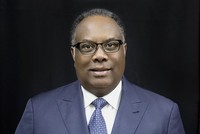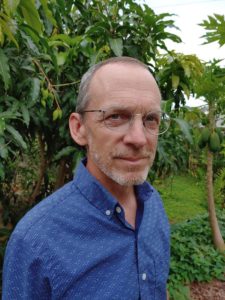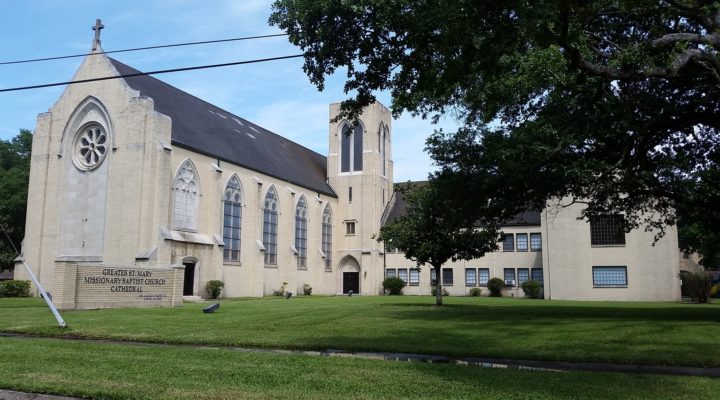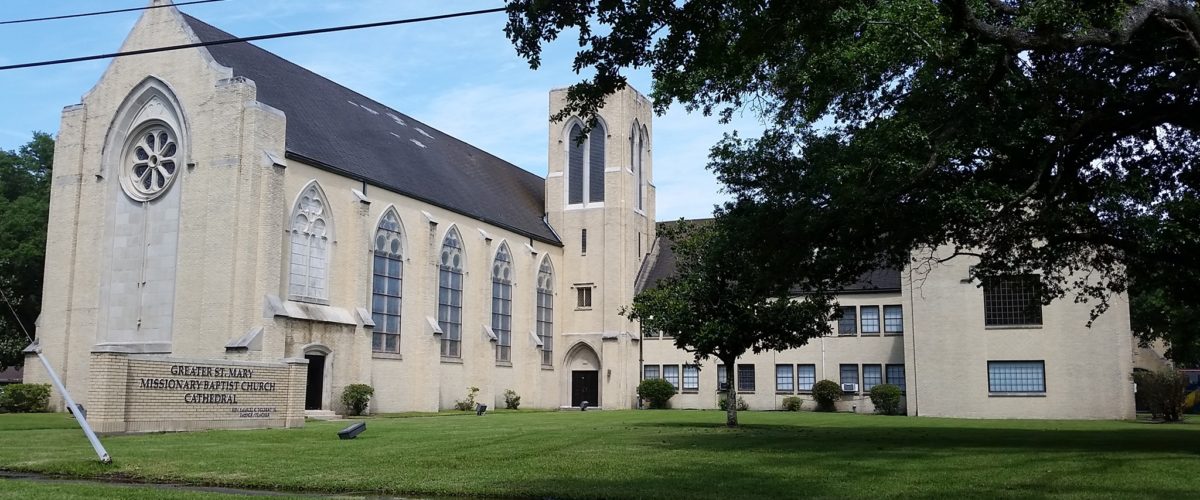Two Baptist traditions — one predominantly Black, the other mostly white — are leaning into a long-standing relationship to collaborate in disaster recovery efforts in Lake Charles, La., the coastal city ravaged by Hurricane Laura in late August.

Samuel C. Tolbert, Jr.
Even with more than 350 churches in the state, the National Baptist Convention of America needs the assistance it is getting from the Cooperative Baptist Fellowship, NBCA President Samuel C. Tolbert Jr. said.
“Outside the NBCA, CBF was the first group on the ground seeking to discover ways to help,” said Tolbert, pastor of Greater St. Mary Missionary Baptist Church in Lake Charles.
The relationship between the two groups dates back several years to a friendship between Tolbert and Suzii Paynter, then executive coordinator of CBF. The bond was sealed when the Fellowship provided assistance after a 2016 flood in Baton Rouge.
Tolbert’s easy-going, pastoral personality makes him easy to work with in a highly stressed environment, said Rick Burnette, domestic disaster response coordinator for CBF.
“He’s outgoing. Warm. Effusive. Energetic,” Burnette said. “I always have a positive vibe and a sense of collaboration from him.”

Rick Burnette (Photo/CBF)
Tolbert, a former Lake Charles city councilman, said that’s a two-way street.
“What I like about CBF is they don’t come in and tell you what needs to be done. They come in and sit down and listen, and they find out what it is you need, and they walk alongside you.”
Tolbert spoke with Baptist News Global about the challenges facing his city, his church and denomination.
How is the recovery going in Lake Charles?
A lot of people are not back yet, and they are having to deal with mold and roofs off. It’s going slow but it’s making progress. Cleanup is under way. The streets are passable, and yards are being cleaned up. I think the recovery is under way. It’s slow, but there is progress.
What is the condition of your church facility since the hurricane?
The building has been sealed off. It was built in 1951, and there appear to be some mold issues and asbestos issues. Probably next week we will begin some kind of mitigation work.
How and where is your congregation?
We have quite a few who are still evacuated. Some of them are coming back slowly since the power came back and if their homes are not damaged. Some are in New Orleans or Houston. Some are in Tennessee. Our church has eight buildings, and our gymnasium, which is at another site, appears to be a total loss.
Are you from Lake Charles originally?
I grew up in this church. Yes, I’m from Lake Charles. I was under the church’s first pastor, Dr. R.B. House, who was pastor for 44 years, and I am the church’s second pastor. I have been here 36 years.
What was church life like for you growing up there?
I grew up in a single-parent home, and my mother believed it was important that we go to church. We were there Wednesday nights. There was a night when the mission group met, and I had to be there. She was in the choir. And we were there all day on Sundays for Sunday school, for worship, then Baptist Training Union, which took place before evening worship. And then we were at evening worship.
What was the training union like?
It was about learning what the books of the Bible were. We did Bible sword drills. We recited Scripture, the Lord’s Prayer, the Beatitudes and the Ten Commandments. We did it all from memory back then.
Does that practice continue at your church?
The Baptist union is not going on in the traditional way. We still try to get some of that done because of the competitions in our association, in our state convention and national association. Some of our young people participate in drill teams learning discipleship and unity and the books of the Bible. I’ve got a group that can recite the books of the Bible forward and backward. The main thing is to get them to where they learn The Lord’s Prayer; a lot of people don’t even know it anymore.
Did you ever have a period away from church, maybe as a young adult?
No. I wasn’t allowed to do that even if I wanted to. It’s not everybody’s experience, but for some reason I liked church. It wasn’t a strain for me to have to do it.
When did you realize you wanted to become a pastor?
In my teen years, or maybe earlier. But I started getting concerned about it earlier in my teens. I could feel the calling on my life to lead, to preach, to teach and just to be part of the church leadership team.
What are some of the challenges facing your denomination today?
I would think that there is somewhat of an apathy in the pew, but also in the pulpit. Baptist churches are autonomous, and some of them think operating alone is sufficient. I do not believe we can carry out the Great Commission by ourselves. A lot of churches now being led by some of the younger pastors may not see the importance of being affiliated with a convention. In their defense, I have to say conventions have to remain relevant. When the congregation is serving the denomination, you become irrelevant. When the denomination is serving the congregation, you become relevant and attractive to younger pastors and their people.
How did the relationship between NBCA and CBF develop?
It began with my involvement, and the involvement of CBF, in the North American Baptist Fellowship. Suzii Paynter and I met in meetings at the NABF, and from there we developed a working relationship that turned into collaboration between NABC and CBF.
When did collaboration begin?
There was a flood in Baton Rouge (in 2016). Suzii called and asked if we had a congregation in Baton Rouge that needed support. We did. Greater Mt. Olive Missionary Baptist Church had been totally devastated. CBF came in and partnered with us, and there was a CBF church in Baton Rouge that became a supporter of Greater Mt. Olive. Now the pastor of that church is the general secretary of NBCA. And there is a room in his church named the “CBF Room” as a tribute to CBF for their collaboration with that church.
What do you see as the strength of ecumenical partnerships?
There is a statement that live I live by. It says to spend more time with others focusing on what we agree on, and to spend less time on what we disagree on. Focusing on what we disagree on has been the challenge for many of us in the Baptist family and in the ecumenical family. We get more done realizing we don’t have to agree on everything.
Related articles:
Bonds forged in flood recovery lead pastor to seminary opportunity


